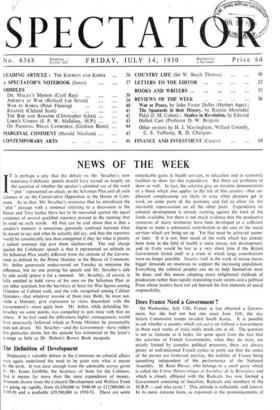The Definition of Development
Wednesday's valuable debate in the Commons on colonial affairs once again underlined the need to be quite sure what is meant by the term. It was clear enough from the admirable survey given by Mr. James Griffiths, the Secretary of State for the Colonies, that it means far more than the mere expenditure of money. Amounts drawn from the Colonial Development and Welfare Fund are going up rapidly, from £6,450,000 in 1948-49 to f12,900,000 in 1949-50 and a probable £19,500,000 in 1950-51. There are some remarkable gains in health services, in education and in economic facilities to show for this expenditure. But there are problems to show as well. In fact, the colonies give art extreme demonstration of a thesis which also applies to the life of this country—that un- pleasant complications are likely to arise when planners get to work on some parts of the economy and fail to allow for the inevitable repercussions on all the other parts. Expenditure on colonial development is already running against the limit of the funds available, but there is not much evidence that the productive resources of many territories have been developed to a sufficient degree to make a substantial contribution to the cost of the social services which are being set up. Yet that must be achieved sooner or later. If it is not, then much of the work which has already been done in the field of health is mere rescue, not development, and its fruits would be lost in a very short time if the British Government found itself in a crisis in which large contributions were no longer possible. Success itself in the work of rescue means bigger demands on resources to support the increasing population. Everything the colonial peoples can do to help themselves must be done, and this means adopting more enlightened methods of production rather than rapidly expanding trade unions and a political Press whose leaders have not yet learned the first elements of social responsibility.






































